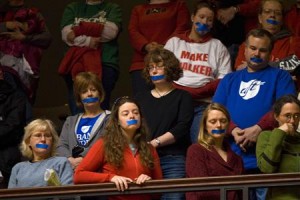 Wisconsin Republicans dispatched police to the homes of absent Democratic senators on Thursday to try to round them up for a vote on a plan to strip public sector unions of most collective bargaining rights.
Wisconsin Republicans dispatched police to the homes of absent Democratic senators on Thursday to try to round them up for a vote on a plan to strip public sector unions of most collective bargaining rights.
While the search failed to find the Democrats, it raised the stakes as Gov. Scott Walker’s self-imposed deadline of Friday for approving the proposal neared.
Wisconsin has become ground zero in a national struggle over labor unions power, and union members from all over the country have converged on the state to protest the proposal.
All 14 Democrats in the Senate fled to Illinois last week to deny Republicans a quorum and a vote on the bill. Republicans hold a 19 to 14 majority but need a quorum of 20 to vote on spending bills. The Democrats fled because they feared they could be compelled to attend if they remained.
Some Republicans suspect the Democrats have been sleeping in their own beds at night. Republican Senate Majority Leader Scott Fitzgerald said he hoped the Democrats could be convinced to return, although he acknowledged police could not arrest them.
“It’s a gesture that shows we’re still serious and a call of the house should be honored,” Fitzgerald told the website Wispolitics.com.
The move came as Democrats and Republicans in the lower house of the state legislature, the Assembly, agreed to limit debate and vote later on Thursday on the bill, which Walker says is necessary to close a budget deficit of $137 million in the current fiscal year and $3.6 billion in the next two fiscal years.
The agreement came after a second straight all-night session in the state Capitol, about 43 hours after the Assembly took up the proposal on Tuesday.
But approval in the assembly, where Republicans hold a 57-38 majority, will not ease the Senate standoff over a plan that has generated widespread protests among Wisconsin teachers and other union members.
More than 50,000 demonstrators poured into the state capital of Madison over the weekend to protest against the plan. If Republicans prevail in Wisconsin, several other states could be inspired to take on the powerful public unions.
U.S. state and local governments are struggling to balance budgets after the recession decimated their finances. Other states like Texas, Arizona and Ohio are relying mainly on cuts in spending, while Minnesota and Illinois are raising taxes.
Already, Wisconsin-inspired curbs on union rights have been debated in the legislatures of several other states including Indiana, Ohio, Tennessee and Kansas.
While only about six percent of U.S. private sector workers are unionized, more than a third of the public sector such as teachers, state and local civil service, police and firefighters belong to unions.
The Wisconsin changes sought by Walker would make state workers contribute more to health insurance and pensions, end government collection of union dues, let workers opt out of unions and require unions to hold recertification votes every year. Collective bargaining would be allowed only on wage increases up to the rate of inflation.
The governor says the changes are needed to close a budget deficit of about $3 billion over the next several years.
But Democratic lawmakers and unionized public employees said the measure is an attempt to bust the unions and choke off funding to organized labor, the single largest source of contributions to the Democratic Party.
Walker wants the bill passed by Friday as part of a plan to push principal payments on general obligation bonds into future years to save $165 million. Under that plan, the bill must be passed by Friday to allow time to sell the debt.
Hundreds of demonstrators continue to protest inside the Wisconsin Capitol on Thursday, turning the building into an indoor campground.
The Assembly debate on Walker’s proposal was broadcast over loudspeakers.
Many of the protesters were from outside Wisconsin, including Peter Peyton, the president of International Longshore & Warehouse Union Local 63 in San Pedro, California.
He arrived in Madison on Wednesday along with 160 union members from 40 different unions in California. Their plan was to stay one night and then go home.
But after they were greeted with cheers in the rotunda when they marched in together, many of the 160 are staying in Madison.
“I’ve done a lot of marching in my time,” Peyton said. “But walking into the Capitol yesterday was something extraordinary. I called back home and told them, ‘You’re not going to believe what’s going on here. You can’t fathom it unless you’re here. We knew Madison was rocking but we didn’t know what was going on.”
Nina Bednarski, an artist from nearby Lake Mills, Wisconsin, who along with her husband Craig Grabhorn has been making some of the most professional looking posters on display in the Capitol building, said her 90-year-old grandmother in Rhinelander, Wisconsin called her last night.
“She told me this is it,” Bednarski said. “This is the showdown.”
The protests took on an international flavor on Thursday when one of Canada’s largest private sector unions said it was sending leaders to join the effort in Madison.
“This is a battle with the big unions … who are trying to come in and dominate this debate from out of this state,” Governor Walker told the Wisconsin Manufacturers and Commerce trade group on Wednesday.
On Madison’s listener-supported community radio station, John Lennon’s song “Power to the People” was playing and Thursday’s forecast was introduced as “the weather for the revolution”
By James Kelleher
MADISON, Wisconsin (Reuters) – (Writing by Greg McCune; Editing by Jerry Norton)





